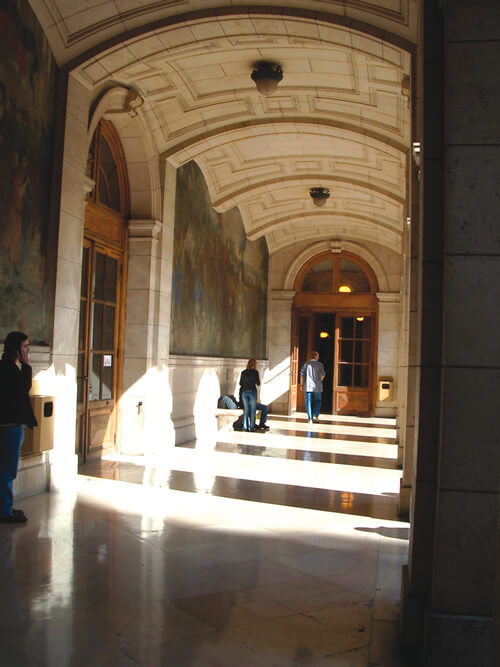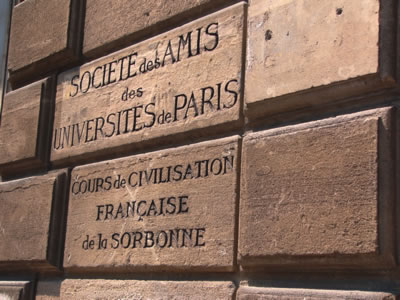Study Abroad in Paris at the Sorbonne
Enjoy Many Offerings at the Famous Cours de Civilisation Francaise
Article and photos by Courtney Lichterman

|
|
Inside the Sorbonne in central Paris with a view of students in a classroom hallway.
|
While Paris offers foreign students an endless list of institutions at which to hone their French language skills, none is as prestigious or as well-known as the Cours de Civilisation Française de la Sorbonne. As a former student of this program, I can testify that the trickiest part of the whole experience comes before you ever set foot on French soil. With no official registration allowed before arrival, an informative, but often confusing website, and no student housing of its own, the Sorbonne puts prospective students in a Catch 22 situation that makes pre-arrival logistics more challenging than the actual program. Luckily, the Internet, as well as the willingness of the Sorbonne administration to make foreign students feel welcome, are making the process easier.
History
Originally created as a thank you to Americans for their help in World War I, the Cours de Civilisation Francaise de la Sorbonne was started in 1919 by the Société des Amis des Universités de Paris (SAUP), an organization, still in existence, founded to promote French culture. Thousands of students from every imaginable culture come through its doors each year, making it one of the most recognizable academic programs of French studies.
Getting Started
As with almost everything in this day and age, the best place to start is with the Sorbonne’s website — not the main site geared mostly to the French, but the site for international students.

|
|
"Cours de Civilization Francaise de la Sorbonne" is carved on a bulding at the Sorbonne in central Paris.
|
Tuition for classes, depending upon which class or classes you take, are all relatively reasonable by comparision to other study abroad programs in France (see the Sorbonne's site for more information on the different costs for each of the many programs available). The Sorbonne accepts credit cards or wire transfers. Students need to be at least 18 and have a high school diploma.
Housing
Unlike most American universities, the Sorbonne offers no housing of its own (although, like the enrollment problem, the school is working on it). Finding housing on your own in an unfamiliar city, especially one in which thousands of students are all in the same boat, can be done. But the best first step check out the Sorbonne's accommodation section for the studying in Paris for the many options.
In addition to the list of dorms, the housing office can also help find a family for a student to stay with. Although this option can be more expensive, it means exposure to French life and, with the right pairing, can really add to the experience. But beware, the in-person approval process often stands for the homestay option, and it’s happened that either host or guest has said no.
Wherever you go, you are on your own as far as making arrangements. Although the student welcome office will help with anything from getting around Paris to finding a doctor, you must contact the dorms yourself. You might want to contact a French-speaking friend to make your calls for you. If you don’t have Francophones in your life, try an online translation service to translate a few basic questions about dates and availability. And remember, nothing will hurt your chances more than accidentally phoning at four in the morning, so keep the time difference in mind.
If none of the Sorbonne options pan out or you simply don’t have the time for the footwork, consider an American-based, all-inclusive program. Although this isn’t ideal for most truly independent travelers, there are several American companies that arrange classes at the Sorbonne with real honest-to-goodness Sorbonne teachers. These programs almost always include housing, excursions, airport welcome and, in some cases, airfare. While this is of course, a more expensive way to go, the cost of some programs is not much more than it would be to put a package together yourself.
These programs can also be a good way of skirting the age limits of some dorms. One program manager I spoke to said they have one student who is 80 years old. Also, some of these programs often have space available at the last minute — the last minute being a month or so before class begins. The other big advantage to using one of these programs is that you will have the camaraderie of other people going through the same experience, which, for some people, is an enormous plus.
If all of these options fall through, one final suggestion is to go the the FUSAC site prior to arrival, as it has a section of short-term apartment and room rentals that are often much more reasonable than those one would find through an agency. The owners of available apartments often post pictures of their properties as do people who are looking to exchange apartments. (Home exchanging for students can be a wonderful option as many “exchangers” are professors on sabbatical or who are teaching abroad for a semester. Often, their schedules coincide well with the Sorbonne schedule.)
Studying

|
|
A lecture hall in the Sorbonne.
|
Once you have life’s necessities out of the way, you can concentrate on your studies. Although the Sorbonne offers classes in everything from French civilization to business French, perhaps its most well-known class is the intensive 11-week 5-hour-a-day course that is meant to whip students into serious shape. Not for the faint of heart, this is truly the way to jump-start your French if you are a beginner, or, if you are more advanced, to solidify your skills (advanced students must come in the summer for this course — the rest of the year the Intensive is only open to beginners or those at the intermediate level). Like most of the courses, this class covers grammar, vocabulary, spelling, literature, and phonetics. The pace of the program really lives up to its name: in most student circles this course is known simply as the “Intensive,” and those who complete it, even if only for a term, rightfully wear their accomplishments like a medal of honor.
If the idea of your academic experience is to have fun with a little studying on the side, this class is not for you. A better idea is to take one of the Language and Civilization or simple French Language courses, which run only 12 to 25 hours a week. Although they still cover grammar, phonetics, and in the case of the Language and Civilization course, French culture, the shorter schedule will allow you to spend part of each day using what you’ve learned with shop owners, waiters, and fellow café patrons.
Whatever course you choose, you will need to take a diagnostic test upon arrival to determine your level of skill. Most classes are offered at all levels in the fall, spring, and summer (the winter schedule is considerably more limited). All courses are taught entirely in French with no exceptions. Regardless of the course level or number of hours per day, every class is taken very seriously by the university and the teaching standards are high.
Finally, while classes are taught using Sorbonne methods and by Sorbonne teachers, the classes are not actually at the Sorbonne proper. While there is nothing wrong with these classrooms (this is an understatement — you can see the Eiffel Tower from some of the rooms at their building on Boulevard Raspail), if you have ever seen the stunning hallways, courtyards, and amphitheaters of the main building, you are really going to be disappointed. Although this is no reason not to attend, it is important to remember when choosing your housing. It’s hardly worth it to go out of your way to find something close to the main building, because that’s not where you’ll be having class.
Regardless of where you take class or where you stay, the experience is well worth it. If you plan to use your French or plan to work in a field that will involve international travel, there is no question that it is a very impressive credit to have on your CV. Aside from that, it’s a wonderful personal achievement that will not only advance you professionally, but personally, in ways you can’t understand until after it’s all over. While it may take a lot of careful planning, someday, you’ll find yourself grateful that you made the effort.
Courtney Lichterman is a freelance writer and former Sorbonne student who lives in Los Angeles, California.
|
